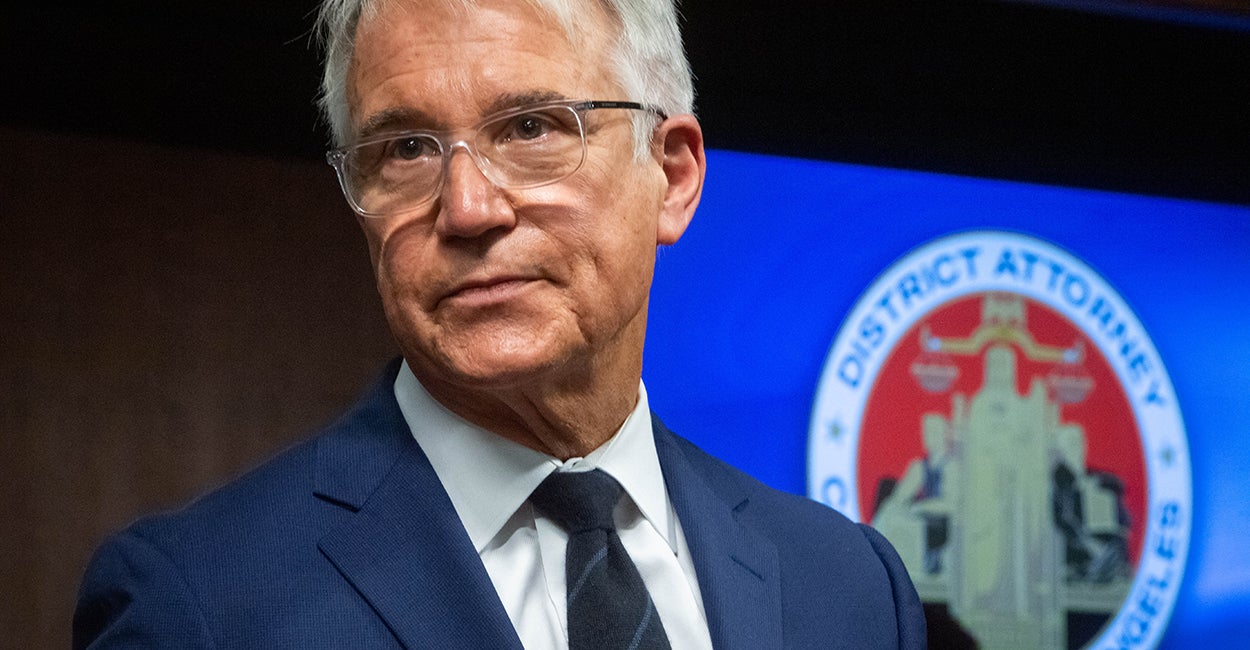LOS ANGELES—What is a rogue prosecutor? Why is Los Angeles County District Attorney George Gascon considered one of the most progressive prosecutors in America? How have his new policies led to a crime increase in Los Angeles?
Gascon has “really completely abandoned his responsibility to the public” as district attorney, says Kathy Cady, a former Los Angeles prosecutor who now works as a victim’s rights attorney.
Gascon’s changes to LA’s prosecutorial system are “negatively impacting communities of color” and “murder victims’ families,” Cady says.
The Daily Signal depends on the support of readers like you. Donate now
Cady joins “The Daily Signal Podcast” along with Los Angeles County Deputy District Attorney Eric Siddall to explain how progressive, or rogue, prosecutors are affecting LA crime rates and crime victims.
Also on today’s show, we ready your letters to the editor and share a good news story about a business owner who is using his love of coffee to fight for the rights of the unborn.
Listen to the podcast below or read the lightly edited transcript:
Virginia Allen: I am so pleased to be joined today by Los Angeles County Deputy District Attorney and Vice President of the Los Angeles Association of Deputy District Attorneys Eric Siddall.
Eric, thank you so much for being here.
Eric Siddall: Thank you for having me. Appreciate it.
Allen: Before we get too deep into talking about progressive prosecutors and Los Angeles District Attorney George Gascon, can you first just explain what exactly a prosecutor is? What do they do? What’s their responsibility? And also, more specifically, what is the job of the district attorney?
Siddall: OK. A prosecutor basically enforces the laws of the state or the nation, depending on if you’re a federal prosecutor or a state prosecutor.
For example, I’m a state prosecutor, so my job is to enforce the laws of California, but we also have certain types of ethical duties as prosecutors very different from other types of lawyers.
Our duty is to first do justice. It is to do justice in an ethical way. We are supposed to follow the law. We’re supposed to be ethical. We’re supposed to, if there’s some type of evidence that shows that the defendant is not guilty, we are supposed to turn over that evidence immediately to the defense lawyer.
Our fight is really to make sure that the system works, that the right people are held accountable, and that we hold people accountable in a legal and ethical manner.
Allen: Excellent. Thank you so much for explaining that. So then when we talk about progressive prosecutors, or some call them rogue prosecutors, when we use that term, what exactly does that mean?
Siddall: I think the term progressive prosecutor has somewhat been bastardized.
My former boss, Jackie Lacey, I considered her to be a progressive prosecutor because she took into consideration other things. Like, for example, mental health was a big initiative that she did when she was the district attorney of Los Angeles.
However, there’s this new brand of prosecutors and really what they’re doing is they’re engaged in a social experiment. … They come here with an ideology and their ideology is really that prisons are always bad no matter what, that our legal system should be completely overturned.
And I’m not trying to sound like I’m being reactionary when I say that. When George Gascon first announced that he wanted to be the district attorney of Los Angeles, he actually said he wanted to turn the whole system upside down.
So really what they’re doing is they’re engaged in a massive social experiment, except they never have to pay the price for their experiments, other people do.
Allen: And speaking of George Gascon and that idea of a large-scale experiment—so, Gascon took office in 2020. Explain what you mean by a large-scale experiment. How would you describe the way that Gascon is leading and this methodology that he has?
Siddall: When he first took office in December of 2020, he basically brought in these orders, he calls them directives. They’re basically orders about how he wants our prosecutors to handle cases.
What was interesting about when these orders came out, it was very clear that they were written not by a prosecutor, not even informed by a prosecutor.
They were written by defense lawyers and people who have an agenda to basically decriminalize certain crimes—he eliminated a lot of misdemeanor crime—but also, people who don’t believe that prisons should exist and therefore, one of the things he did was he created these arbitrary numbers saying that after 15 years, everyone’s sentence should be reexamined.
And he also banned prosecutors from using certain types of conduct enhancements. And conduct enhancements are basically a way to be able to punish certain crimes differently because the conduct of the criminal is different.
For example, if a criminal injures someone during a crime and creates great bodily injury to that person, that person should be treated differently from the criminal who doesn’t. That’s logic. And the penal code reflects that logic, those values. George Gascon immediately wanted to eliminate conduct enhancements.
He also wanted to eliminate enhancements that dealt directly with a person’s prior criminal record. If you’re a career criminal, you should be treated differently from the first-time offender. And again, the penal code in California reflects that value system. He wanted to get rid of that as well.
Basically, he wanted to get rid of every single tool that we have to deal with the most severe criminals and the most career-oriented criminals, and there was career criminals and dangerous criminals. He got rid of all those tools to deal with those two specific groups.
Allen: Why? In the name of what?
Siddall: I think you would have to ask him why he did what he did. It would be a pure speculation on my part.
There is some rhetoric that he thinks or that he hopes that the system will become more racially equitable because of that. But all it really does, this type of program that he’s implementing, is it makes sure that the most violent offenders and career criminals are not appropriately punished and held accountable.
Allen: Then how does that work out practically in society? Has crime increased in Los Angeles since Gascon took office?
Siddall: There has been a general crime change or trend in California and in Los Angeles and there has been an uptick in crime.
I think it would be misleading at this point to blame him [for] the huge uptick, for example, in homicides. My issue more is that I do not believe that he has a plan to deal with the trend in crime. And crime is one of those things that once it gets embedded in a neighborhood, it’s very difficult to take out.
And we did a remarkable job as a society since 1994. For about 20 years, we brought extremely low crime rates. And the primary beneficiary of these lower crime rates were marginalized communities. In Los Angeles, it would be communities like Watts, Compton.
I actually spent most of my career in the Compton/Watts area so I’m very familiar with what happened.
I remember there was a father whose son was murdered and the father was a gang member. He was kind of a retired gang member and his son was marginally a gang member. And his son was killed by a guy from their same gang.
And I think it was one of the most moving moments I remember. After we convicted his son’s murderer, he came up to me and he said, “I have been through this courthouse many, many times, but it’s great to see justice happen.”
And we were able to really bring peace to neighborhoods that were at war with themselves for decades. And there was this incredible carnage that I think people forget about in the ’70s and the ’80s and the early ’90s, young men were dying at an alarming rate.
One of the great successes that we were able to have because of our fight in crime is that these young men were living and they were living long lives. And as a result, those communities were radically changing. They were improving economically. Their schools were improving.
One of the things that people I think sometimes forget is that a lot of city schools, especially urban schools, actually had a huge increase in test scores because of our investment in the community, our decrease in crime. All these different factors really started making these places livable.
And unfortunately, what we have been experiencing over the past couple years is a return back to the era of chaos, and the era where that peace was not there.
And violence doesn’t just impact the immediate victim, it does not just impact the perpetrator of the violence, but it really affects the entire community. It makes the community unlivable. It will even decrease test scores for students there because when you live in a place with violence, when you live in a place where there’s lots of gunshots, adrenaline levels are so high in those communities because they’re trying to survive. And when you have higher adrenaline, you don’t do well on tests.
And so I think that one of the things that’s so unfortunate about this new wave of experimenting with the criminal justice system is that really the effects and the costs are not borne out by the people who are the social experimenters, they’re borne up by the people who live in communities who are already disadvantaged.
Allen: Eric, thank you so much. Stay tuned because up next, we’re going to dive a little deeper into the realities of progressive, or rogue, prosecutors with Los Angeles victim’s rights attorney and retired prosecutor Kathy Cady.
Kathy Cady joins us now. She is the former LA prosecutor and is now a victim’s rights attorney in LA. She provides pro bono representation to crime victims and assists them with asserting their rights in criminal and juvenile justice cases. Thank you so much for being here.
Kathy Cady: Thank you for having me and for covering this really important topic. I’m glad to be included. Thank you.
Allen: You worked as a prosecutor for over 30 years. You’ve really seen this whole system for years and years and years. Talk a little bit about some of the changes that you have seen personally from before Gascon was the district attorney to now him being the district attorney.
Cady: I worked under a number of prosecutors. I was a DA under Steve Cooley for 12 years and for Jackie Lacey for eight. And when I retired, Jackie was still the DA. And I’m definitely a fan of Jackie Lacey. I think she was an amazing district attorney.
I will say that over my career in the office, there was kind of a move, I would agree with Eric that there was a move. Jackie was progressive and she was moving toward mental health diversion.
There were other ways that we were looking at trying to make things better. That’s what you always want to do when you’re in a system. You want to look at what’s working, what’s not working, and then try to make things better.
I would say that during my career in the office, I saw that over and over again, and it was the best career ever. I loved being a prosecutor and I loved getting up and going to work every day to know that I was there to do the right thing.
Allen: I know you have personally, obviously, prosecuted so, so many cases over your long career, have you personally been a part of any cases where you feel like the victims you were representing didn’t get that justice that they deserved or that they needed to have closure?
Cady: You’re talking about when I was a prosecutor? Well, sure. Any prosecutor who’s been with the office for a long time certainly has handled cases and/or done jury trials that did not turn out the way that they had hoped and that they thought the evidence would suggest that it would turn out that way. And I’m not alone in that.
I tried about 90 jury trials and when I was in the office, felony jury trials. And I certainly had some cases where the jury saw the evidence differently and victims, I think, felt very sad about that.
What I would say is different now is that when the justice system is working, you as a prosecutor or even as a victim’s rights attorney could talk to the victim and say, “Look, we tried everything we could, and this is what happened and I’m sorry, but this is how it worked.”
Or sometimes in cases, the evidence, there’d be problems with the evidence and you would talk to the victims and you’d say, “Look, there are real issues with the evidence in this case and we need to offer a plea bargain to something.”
And victims might be disappointed, but I think they’re willing to listen. And if you have a reason as to why you’re doing things, they can understand that. They may not be happy with the result, but I think they generally can understand what was going on.
The difference between then and now is that victims will say things when they’re being told, “OK, well, we have to dismiss this allegation, this gun allegation, this gang allegation.” And the questions, of course, were, “Well, why?” And prosecutors, of course, were left to say, “Because of a policy.”
And that is what has been so different. Because victims, if you similarly now were looking at a case and said, “You know what? We have to dismiss the gun allegation because there’s problems in the evidence. There’s this issue, there’s that issue, and so that’s the reason we have to do it,” I think victims would be able to understand that.
But when the issue is, “Well, actually, the only reason we’re dismissing it is because we have this newly elected prosecutor and he has a policy, not a law, that is requiring us to dismiss it,” victims, that’s when they feel completely abandoned. …
They recognize that the law still allows that a case be handled in a certain way, but when a person who’s come in and has been elected and has sworn to uphold the law is really not upholding the law and is undercutting the case for reasons that don’t make any sense, that’s when victims, I think, feel abandoned.
Allen: If you would, talk about some of those policies that Gascon has put in place that he has changed where you do have situations like that, where you’re having to throw out gun charges or things like that. What’s shifted?
Cady: So, to talk about a couple cases? Sure. One of the ones that I would talk about is his “youth justice” policy.
The law allows that when you have a 16- or 17-year-old who commits a really horrific crime, that they can be charged in criminal court. And there’s a process where you do that and it’s called filing a transfer motion. The only way you can get it to criminal court is the district attorney’s office has to file this transfer motion.
Well, so, there were apparently 77 cases where there was a transfer motion that was filed when Gascon came in and he ordered that all of those transfer motions be withdrawn.
I have represented well over 20 murder victims’ families where the person who murdered their loved one was under 18. And so to say to them, “Well, the case is no longer going to go to criminal court. The person who killed your loved one is going to stay in juvenile court. And what that means is that they will only stay in custody for a handful of years. They definitely will be released by the time they’re 25, if not before,” is very devastating to crime victims.
Just as a couple of examples, I represent a family where a man who was almost 18, one month shy of 18, he murdered two sisters, one who was 16 and one who was 27. He executed them both and then he set the apartment where they were in on fire to try to cover up his crime.
And you might imagine that for the family who lost those two precious young women, finding out that the reason that the person who murdered their loved one was perhaps not going to go to a criminal court was based on a policy was very devastating.
Another example, two amazing young men, Alfredo and Jose, who were both gunned downed by gang members. And one of them was just starting his career with NASA and the other one was about to be a first-time father. And they were both gunned down by gang members who were out hunting, meaning they were out just looking for people to shoot and murder.
So two gang members who were 16 and 17 years old, because of the blanket policy, were not put up to a criminal court and stayed in juvenile court.
For those families, it’s devastating. It’s just absolutely devastating.
Another example that I would give is that victims, mostly murder victims’ families, before Gascon, when their murderer was going to be coming up for parole, the person who murdered their loved one was coming up for parole, the district attorney’s office would send a prosecutor to the parole hearing. And that happens throughout the state in California, but not in Los Angeles, not after Gascon took office.
He took office I think on Dec. 7 or 8 of 2020, and victims were called that day to be told, “The parole hearing that you have to go to tomorrow for the person who murdered your loved one, however many years ago, the one that I’ve been telling you, ‘I’ll be coming to with you, I’ll be there,’ I can’t go. You’re going to have to do it on your own tomorrow.”
And so throughout the last year, there’ve been a number of us pro bono attorneys who’ve been representing victims at these parole hearings. And again, it’s based on a policy and he won’t send anyone to represent the victims.
He now will not allow victims to actually get information about the person who’s in custody, to find out how they’ve been doing and whether to expect that they’ll be paroled or not paroled. So victims are going in totally blind without having anyone there to assist them.
He’s really completely abandoned his responsibility to the public, but especially to these murder victims’ families. I’ve had an opportunity to assist victims through some of those parole hearings as well as a number of other people with whom I work do that same work, but it’s been just devastating to crime victims.
Allen: You hear these stories and you hear you talk and it feels a little bit unbelievable, I guess, that someone could be watching this play out and not see that there’s some issues or some problems in the methodology.
And I think people on both sides of the aisle agree changes need to be made to the criminal justice system. There should be reforms in areas.
And that is something that Gascon has been very gung-ho about, is, “We need reforms, we need changes, we need to rethink the criminal justice system. We need to end mass incarceration.” But the way he’s going about it, I think, is giving a lot of people like yourself pause.
Why do you think he’s forging ahead right now when people like yourself who have so much experience in the field of prosecution are publicly saying, “Whoa, whoa, wait. This isn’t working”?
Cady: He certainly had at his fingertips when he came in many, many experienced prosecutors who had years of knowledge and expertise in any number of fields, the ones that I’ve just talked about, juvenile justice as well as parole, but gangs, all kinds of other areas as well. And he foolishly would not actually listen to them.
He claimed that, of course, he wanted to listen to what prosecutors had to say, but he clearly over the last 14 months has not listened to what any experienced prosecutors have had to say.
They’ve been telling him since Day One that his policies are foolhardy and will result in people being harmed, communities being harmed, public safety being impacted. And he doesn’t care.
He seems to continue to go to the handful of people that he handpicked from the public defender’s office to come over to give him guidance. And clearly the policies that were written that he sticks to were written by these people when they were still public defenders.
Prosecutors, unfortunately, personally in the office right now and certainly at the very beginning felt as though if they didn’t do what Gascon wanted, the people who would be turning them in, so to speak, would be public defenders.
It was almost as though the prosecutors going into court felt like they were having to work for the public defender’s office or that they would get in trouble and be tattled on, so to speak.
For victims who have been telling him since Day One—and I personally have told him on numerous occasions, both on Zoom calls as well as through emails, that he is continuing to really negatively impact and devastate crime victims.
Again, I’ve represented over a hundred murder victims’ families over the last year and a few months. And it’s been very clear, made clear to him by myself as well as a number of other people that what he is doing is negatively impacting communities of color and that especially murder victims’ families are devastated. And for reasons that I cannot begin to explain, he does not care.
Allen: And sadly, the situation of these progressive prosecutors and George Gascon, it’s not limited to Los Angeles. We know that this is happening in cities all over America. So we certainly encourage our listeners to follow the work of Zack Smith and Cully Stimson of The Heritage Foundation that are covering rogue prosecutors all over the U.S. in great detail.
But Kathy Cady, thank you for your time. We really appreciate you being here.
Cady: Thank you so much. Appreciate it.
Have an opinion about this article? To sound off, please email letters@DailySignal.com and we’ll consider publishing your edited remarks in our regular “We Hear You” feature. Remember to include the URL or headline of the article plus your name and town and/or state.































